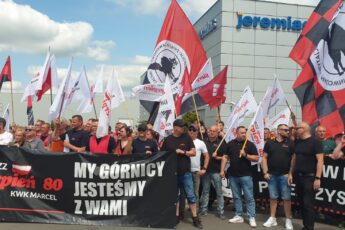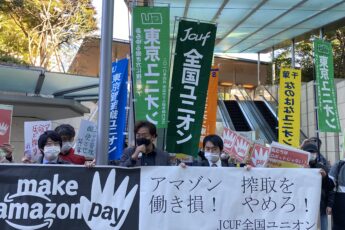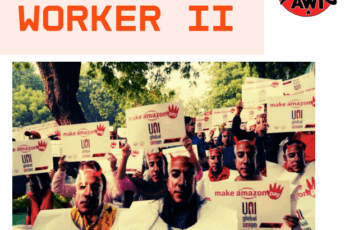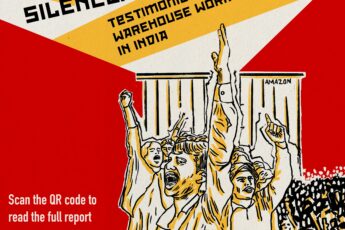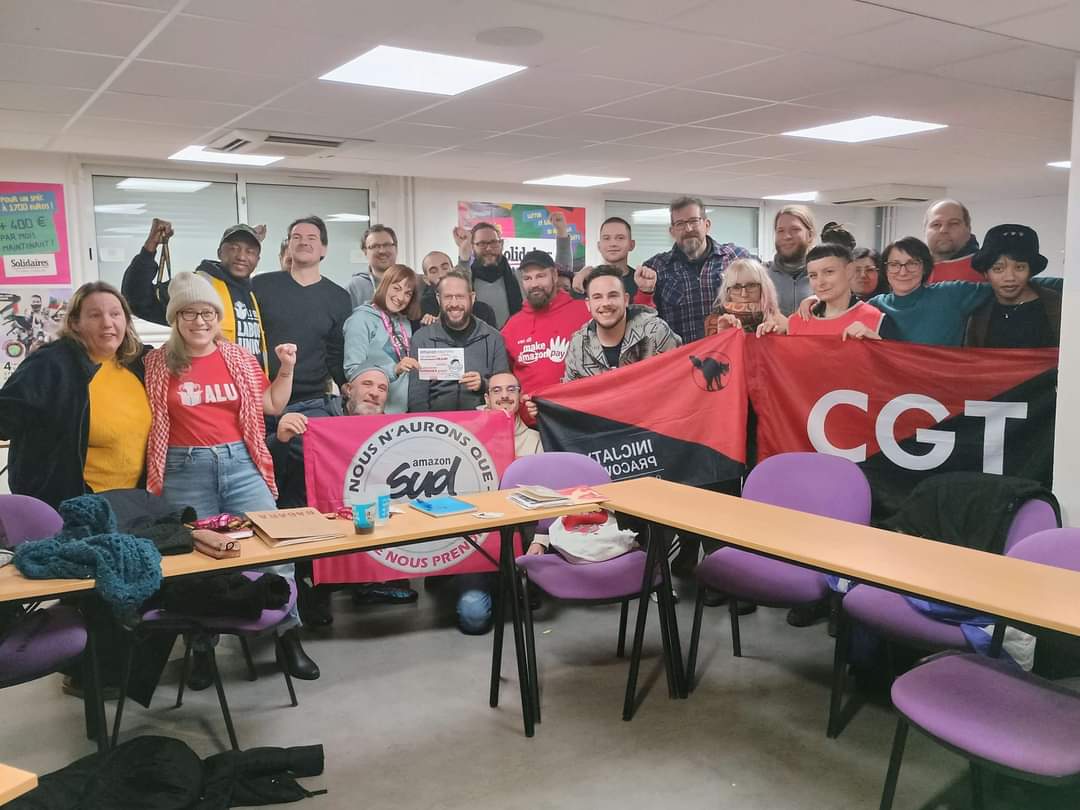
Between January 19 and 21 we participated to the meeting organized by Amazon Workers International (AWI) in Paris. Since 2015, AWI has been meeting regularly, once or twice a year, to build a transnational space of communication, discussion and organization among Amazon workers despite and beyond the different local and national conditions in which they work and struggle. This time, more than thirty workers took part in the meeting, coming from different unions and from different countries, from Spain to Germany, from Poland to France and the United States.
The Fight against Amazon from Poland to the United States
During the meeting, workers shared their experiences of recent struggles and discussed the ongoing situation in Amazon warehouses in different countries. Workers from Poland (where Amazon has 13 warehouses) reported on their continued attempts at organizing trough Inicjatywa Pracownicza (currently the most representative union with 1000 members) and at fighting for higher wages (around 5 to 6.25 euros per hour). These attempts are often complicated by the ever-increasing working loads and by the company’s practices of union-busting, in many cases allowed by institutions. Last year, IP started a campaign to collect the signatures that in Poland are required to officially call for a strike. Although a majority was not reached, around 30% of the workers were in favor, despite Amazon obstructing the collection of signatures. Workers from Spain (where Amazon has 32 facilities) updated about their demands for the improvement of sanitary conditions in the warehouses and for increasing wages. Amazon is also opposing their struggle for a national contract, so that it can pay different wages in different regions (9-10 euros per hour in the poorest regions and up to 12 euros in Catalonia and the Basque Country).
Workers from New York, who are part of Amazon Labor Union and are involved in a fight to democratize the union, reported on working conditions in the Staten Island warehouse (JFK8), one of Amazon’s biggest in the United States, where between 5.000 and 8.000 workers are employed depending on the season. They explained the difficulties of organizing in a context marked by professional union-busting and by extremely high rates of turnover (150%). They also reported about the extremely dangerous working conditions in the warehouse, which often lead to health problems for many workers. Pregnant women are pushed to work as fast as all others, and some of them had miscarriages in the warehouse. Workers from Chicago talked about how they had to start organizing from scratch after the warehouse where they had built a strong activist base as Amazonians United in the past years was closed and divided into smaller facilities. They also recounted that Amazon employs a very high number of undocumented Hispanic immigrants, who are doubly blackmailed for this reason often avoid participating in organizing activities. Amazon’s exploitation of migrant workers is a transnational constant, as AWI workers experienced in September. While touring warehouses between Germany and Poland, they found out that in some cases Ukrainian migrants make up to 70% of the workforce. Similarly, in many Italian warehouses, a huge proportion of temporary workers are Eastern Europeans .
While fighting for higher wages and better working conditions, Amazon workers have also faced the threat of closures and layoffs in recent months. Amazon’s expansion, which seemed unstoppable after the pandemic, has slowed down and often turned around. In Germany, for example, Amazon had doubled its facilities in the immediate aftermath of the pandemic (to 145), but the tendency has now stopped. In 2022, Amazon still inaugurated three new fulfillment centers, but now many of the planned warehouses won’t open. Already-built facilities will be leased to other companies in the logistical sector. Moreover, one airport hub and one fulfillment center in Brieselang, near Berlin, were closed. The threat of closures and layoffs has been used by Amazon to worsen conditions in other German warehouses, for example by imposing more heavy shift timetables. More broadly, in Germany the repression against unions and organized workers has been increasing, with the targeted firing of the most active organizers.
The same trend is common in other countries. In January 2023, Amazon announced the closure of one of its two warehouses in Barcelona (BCN2), arguing that it was too technologically backward to be modernized. The closure was also used to increase workloads and put pressure on workers in the other one (BCN1), which has more than 4000 employees. Workers went on strike at the beginning of February, managing to obtain better terms in exchange for being transferred. In the United States as well, since 2022 Amazon started to postpone or pause the planned opening of tens of new facilities, while closing several others. In most cases, however, political reasons, specifically the repression of workers’ organization, has been a major driver in deciding which warehouses to close. For example, Amazon stopped plans of expanding the warehouse in Bessemer, Alabama, that had gained broad attention for a failed unionization vote in 2021. Or, as already mentioned, it closed the warehouse in Chicago where the first nucleus of Amazonians United had been at the forefront of workers’ struggles in the United States before and during the pandemic. The tendency, however, is not homogeneous, as in Poland a new warehouse is expected to open this year.
Transnational Organization Beyond Communication
Overall, rather than shrinking its dimension, Amazon appears to be rationalizing and restructuring its operations, in the attempt to cope with a politically and economically unstable scenario, particularly in Europe, in which even more flexibility in logistics is required. While during and after the pandemic Amazon seemed to be relying on unlimited opportunities of expansion and growth, now it is reshaping its structure to secure profits in an increasingly disordered context that makes it far more complicated to plan long-term investments. For this reason, Amazon stopped building new sites and is trying to concentrate flows in fewer warehouses, to diversify their activities, to rely more on third-party contractors in logistics and to further mechanize facilities so as to proportionally reduce the number of workers, while worsening their overall conditions. This changes within Amazon, then, cannot be understood without looking at what is happening outside of Amazon: at the consequences of inflation and of recession, but most crucially of war, which has had a major impact on living and working conditions, especially in Eastern Europe since the Russian invasion of Ukraine and which is now jeopardizing global supply chains after military tensions broke out in the Red Sea as a consequence of Israel’s war on Gaza.
Thus, the discussion held in Paris proved once more the importance of connecting workers from several countries and from different conditions to fight a company that relies on its transnational dimension to make profit and to bypass struggles. This has been done systematically by Amazon since it expanded to Eastern Europe, most evidently in 2013 against German workers’ strike, and more recently during the pandemic, when French workers were on strike in massive numbers. In both cases, Amazon imposed mandatory overtime to Polish workers in order to still meet the increasing demand despite strikes and stoppages, proving that a transnational organization capable of going beyond national and local specificities is an inescapable necessity. From this point of view, in the last decade AWI has been a crucial space to build, strengthen and maintain a transnational communication that endeavors to discuss and face local differences.
At the same time, the meeting in Paris also showed that to effectively organize and strike against Amazon at a transnational level, it is also necessary to understand how wider social and political processes affect working conditions within warehouses. Most urgently, it is important to acknowledge how the war is impacting material conditions and possibilities of organization in Eastern Europe and how it is reshaping logistical supply chains, but also how the specific exploitation of migrant and women influences the organization of production. In fact, the fact that women in Amazon warehouses are pushed to work even if pregnant up to the point of inducing spontaneous abortions has clearly to do with broader conditions of social reproduction, while the institutional racism that imposes upon migrants the blackmail of documents has decisive role in worsening the conditions of all workers and in limiting the possibilities of organization.
To acknowledge this, it is clear that communication needs to be followed by the building of a common discourse and of a common attempt at strategizing in the longer term. For this reason, it is relevant that participants to the meeting in Paris, beyond sharing their experiences and comparing conditions in different countries, also started to make plans for realizing common actions, for striking together, and for fostering common demands in the next months. At the same time, it is also crucial not to isolate the organization against Amazon and not to look at the struggle of Amazon workers as separated from other social and political struggles. On the contrary, precisely because racism and patriarchy impact working conditions in the warehouses, we believe that the connection with feminist, migrants, anti-war and ecological struggle can be crucial to strengthen the possibilities of a transnational organization against Amazon. As TSS, we have been experiencing the difficulties of organizing within and beyond differences and of keeping together struggles from so many specific contexts, but we believe that it is precisely these difficulties that make organizing on the transnational level into a necessary challenge. For this reason, we will keep supporting AWI’s efforts to build a collective force against Amazon as part of our effort to struggle against war politics, patriarchy, institutional racism and exploitation.


